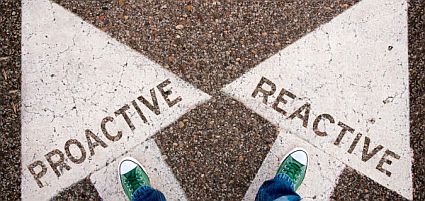We live in worlds of constant interruption. Each morning, our inboxes and feeds are filled. Our attentions are drawn to those, we go through them, dealing with each one. Some one has asked a question, we have to respond with an answer. Someone has raised an issue, we have to address it. Something has happened in our social feeds, we have to jump into the conversation, if only to click a like.
Our customers, partners, peers, managers ask us questions or make suggestions, we have to deal with each of them, immediately.
Our phones and other devices vibrate, an alert comes up, our attention is diverted. We get texts, we have to deal with it immediately (somehow texts seem to drive immediate response where emails might wait a bit…..)
We may get a text about an ad hoc meeting that’s happening, we divert our attention to it.
As much as we may complain about these interruptions, the reality is they are fulfilling. We are busy, our days are filled with reacting and responding. At the end of the day, we’re exhausted. But we then reflect and discuss how busy we were. Our days are filled, we are very busy. And that activity makes us feel as though we have accomplished a huge amount.
The reality, is we’ve probably achieved very little. In our time management reading or courses, we’ve been taught to write down our priorities and what we want to achieve. We’ve learned we have to put together action plans, the next steps to achieve our goals. While we are diligent in doing these, our days are no longer ours. They are filled with react/respond. So the next day, we rewrite our lists, moving things forward from yesterday, knowing that we are likely to be doing the same thing tomorrow.
Yet we are busy, our days are packed, and more things that we must respond to pile up.
And as we review our days, we see how busy we are. We look at how much we accomplished. We worry about all the stuff we have to respond to that we didn’t get to today.
We usually fail to ask ourselves one thing. “What progress did I make on achieving my goals? What am I doing proactively to move forward in accomplishing what I want to and need to accomplish?”
A friend and client, Matthew, and I were talking to his sales team about this recently. Matthew posed some challenging questions:
- Why do you feel you have to respond immediately? What would happened if you waited a little? Would you have a better response?
- Do you need to respond at all? Would the issue go away if you ignored it?
- When does the customer need a response? They probably don’t need it right now and you can provide a better response later (also taking less time.)
- What are you not achieving, because you don’t have the time to do those things?
React/respond is seductive. We feel we are busy, we look busy to those around us, we feel we are accomplishing things. We can look at all the emails, texts and calls we responded to. We can look at all the comments and discussions we engaged in on our social channels, as well as the mindless outreaches. Our busyness gives us the endorphin rush that makes us feel as though we accomplished a lot. AI/ChatGPT is a placebo that helps us feel even better. It makes us more efficient, so we can do more and more of the same react/respond behaviors. We feel we have done a lot of work, that we are very busy. We have the data that supports those feelings.
The problem is, when we take the time to look at, “What have we done to achieve our goals? What have we done proactively to move things forward?”
Too often, if we ask ourselves those questions, we see we have done little.

Leave a Reply